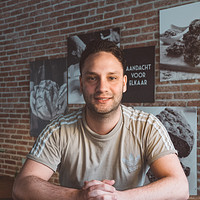Push your boundaries - Olumide helps children in Nigeria to develop their dreams with The Shoe Project
Olumide Omotoso grew up in Nigeria, lived in Dubai for nine years and came to the Netherlands in 2017. After writing his thesis, he got the idea for The Shoe Project, which he initially used to collect shoes for Nigerian children, but which has since grown into so much more than just a collection campaign. Speaking with us from Nigeria, the student of the short degree programme International Business talks about his motivations. "Helping people makes me happy. And I like being happy, so why not help as many people as possible?"
Hi Olumide, how did The Shoe Project start?
"It actually came to me spontaneously three years ago when I had completed the Master's in Sports Business Management and I had interviewed some Nigerian footballers for my thesis. I wondered: how could I help young athletes in this country? They have to deal with a lack of balls and shoes and I thought: I want to do something about that. First, I wanted to go and buy shoes, but even the richest man on earth cannot buy enough shoes for all those children. But then I looked at my own shoe rack and saw how many shoes I already had that I wasn't using. That was quite a lot. Then I phoned some friends and they had the same thing. And that's how it actually started. I handed in my thesis on my birthday, 28 September 2018, and that was actually the perfect start to this project."
What is the goal of the project?
"The main goal is to use these shoes to inspire and encourage children to stay on the right path, so that they stay far away from drugs, alcohol and crime. Together with some coaches, scientists and physiotherapists, among others, I am developing master classes and seminars that actually run parallel to football. We want to give the children some control over their own lives and try to show them that they are appreciated. We also encourage them to read and explore as much as possible, because that way they develop dreams. And that is very valuable. ''
So it's actually much more than just a fundraiser?
"Absolutely. We don't just give the children shoes, but we value their talent and help them get by. Most of them have never had the chance to walk on decent shoes either, but in the end, the shoes are just a catalyst to generate attention for the project. It also motivates the children and keeps them going. It's quite a new concept and I don't know if anyone has done this before in Africa. We have a lot of ambition, but we still have a long way to go."
Why is it so important for these children to play sports?
"We have to give them a future. They don't necessarily have to play sports, but they can also be inspired by what we do. As long as they develop discipline and stay in school. We also try to arrange scholarships for them. Just so they keep hope for a better future. Eventually we hope to do this project in other countries as well. ''
I feel very strongly about this and I think that anyone who has something should help others who don't. I may not have enough money to buy shoes for everyone, but I understand how projects like this work. That is how I try to help.
And what has been the response so far?
''The reactions are really overwhelming. We are working together with ten different football clubs, schools and orphanages. At first I thought it would be a one-off, but I have a fantastic team here in Nigeria. We've already said we want to get together more often, but unfortunately we weren't able to do much last year because of corona, so, so far, we've only been able to bring over 50 shoes in 2019. But now that everything is getting back to normal, we are entering a new phase of the project and have already collected about twenty pairs of shoes. But we expect a lot more, especially if the project gets some more attention online."
Why did you want to do this so badly?
"I am a footballer myself and somehow I just have a great urge to help people. Growing up in Nigeria is not easy and many children are struggling. I feel strongly anyone who has something should help others who do not. I may not have enough money to buy shoes for everyone, but I do understand how projects like this work. That's how I try to help. And the plan was actually to inspire children, but now I am mostly inspired myself. Of course I enjoy helping people: it makes me happy.''
Is this something you want to continue doing after you finish your education at Saxion?
"This project is something I really do for the children themselves, and of course I can't make a living out of it, but eventually I want to study to become a teacher, so that I can stand in front of a classroom. Stimulating and inspiring children is such a beautiful feeling. That is what I want to do. I also have a business, similar to The Shoe Project, with which I teach Nigerian athletes to stimulate education. Many African children think that if they have talent for sports, that's enough. They don't see the importance of a good education. The main goal is to eventually get the best talents to Europe, so that they can broaden their horizons there."
When is The Shoe Project successful for you?
"For me, this project does not have to have an end. I hope the project will be big and that when I'm dead it will continue. It really is a legacy. As long as it helps people, I hope it never ends."
